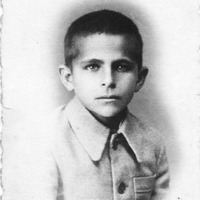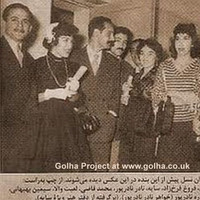Firidun Mushiri
Mushiri, Firiydun (1926-2000), son of Ibrahim Mushiri Afshar. He was born in Tehran. One of his ancestors was an army general under Nadir Shah who had been transferred to Tehran. Having settled in Tehran in his youth, he found employment at the Ministry of Post and Telegraph in 1919. He developed an interest in poetry with his family who read Hafiz, Sa’di, and Firdawsi at all times. Having studied the first two primary grades in Tehran, he travelled to Mashhad when his father was transferred to Mashhad, though he returned to Tehran after a few years and received his first three years high school education at Dar al-Funun and the Adib High School. He states, “We returned to Tehran and I furthered my studies at high school and university in the unrest prevailing in Iran in 1941 consequent to the allied forces invasion from the north and south. Although I noticed my father’s financial straits as a civil servant and I was unwilling to have the same fate, but domestic issues and my mother’s failing health among other things forced me to find an employment at the Ministry of Post and Telegraph at the age of 18 to retire after 33 years about which I have made a composition entitled ‘Umr-i Wiran (‘ruined life’).” Moshiri’s mother, A’zam al-Saltana, bearing the title Khurshid (‘Sun’), was interested in poetry and literature and at times composed poetry. His grandfather, Mirza Jawad Khan Mu’tamin al-Mamalik, was also a poet with the nom de plume Najm whose diwan is still unpublished. Moshiri found an employment at the Post and Telegraph Administration while proceeding towards his high school diploma. The loss of his mother when he was 39 years of age left deep scars on him. Later, while taking evening classes at the technical school of the Ministry of Post he embarked upon his journalistic and writing career. His studies in the field of Persian literature at the University of Tehran were hampered by his administrative occupations and journalistic career, though he did not cease his press activities. He was the director of the poetry and literature pages of the Rawshanfikr journal from 1953 to 1972. These pages, later entitled Haft Tar-i Chang (‘The Seven Strings of Harp’), treated of all literary and cultural areas, like book reviews, cinema, theater, painting, and poetry. Many a contemporary poet of renown contributed their debuts to the Rawshanfikr. Later on, he served as the director of the poetry and literature pages of the Sipid u Siyah and the Zan-i Ruz. Having embarked upon his poetical career at the age of 15, his early compositions were influenced by his father’s Shahnama readings. His first collection of poetry, Tishna-yi Tufan (Thirsty for Tempest), with introductions by Muhammad Husayn Shahriyar and ‘Ali Dashti, appeared when the poet was 28 years of age (Nawruz 1955) as to which he states, ‘They were stanzas comprising of three hemistiches and a short line. Such poetry, possessing rhythm, rhyme, and meaning, was also composed by some other poets, e.g. Nadir Nadirpur, Hushang Ibtihaj (Saya), Siyawush Kasra’i, Mahdi Akhawan Salith, and Muhammad Zuhari. They made names for themselves with their poetry, since they were not indifferent towards classical poetry. Akhawan Salith, Nadirpur, and I were well-versed in classical poetry, we had studied Sa’idi, Hafiz, Rudaki, and Firdawsi, among the classical poets, and would discuss and rely upon them.’ Mushiri accorded particular attention to Persian music as a consequence of which he served on the Council for Music and Poetry of the radio and along with Hushang Ibtihaj, Simin Bihbahani, and ‘Imad Khurasani made significant contributions to intertwining poetry with music and enriching the Gulha-yi Tazih Programs of Radio Iran in those years. He was well-versed with the dastgahs and gushas of Persian classical music. His acquaintance with Persian classical music traced back to his mother’s family who were involved in classical music and theatre. His maternal uncle, Fazl Allah Baygan, was an actor who lived on Lalazar Street (in an alley where the Tehran Theater or the Barbad Association located). In those years, they listened to music every evening when they had departed Mashhad for Tehran. Mihrtash, the founder of the Barbad Association, and Abu al-Hasan Saba were friends of Fazl Allah Baygan who played the setar and the violin in the evenings and at the 14 or 15 Mushiri eagerly listened to their music. Mushiri travelled to Germany and the United States in 1998 where he read his poetry in Koln, Limburg, Frankfurt, and 24 states in the US and the Universities of Berkeley and New Jersey which were unprecedentedly welcomed by lovers of Persian literature. He read his poetry in a number of cities in Sweden, e.g. Stockholm, Malmo, and Gutenberg, in 1999. His familiarity with modern forms of poetry impeded him from following the footsteps of the classical poets, but he opted for the golden mean; he neither was enslaved by traditionalists’ prejudice nor was he absorbed by extremist modernists, but he aimed at the final goal of the founders of modern poetry, he refrained from following the prosodic meters, felt free to make use of short and long lines as well as logical use of rhymes and in terms of meaning developed a novel view of nature, things, and people thereby marking his poetry by certain characterstics. His works include: Baztab-i Nafas-i Subhdaman (collection of poetry); Az Darichih-yi Mah; Nawa’i Hamahang-i Baran; Ta Subh-i Tabnak-i Ahura’i; Awaz-i An Paranda-yi Ghamgin; Lahzaha wa Ihsas; Ba Panj Sukhansara; Az Diyar-i Ashti; Sih Daftar; Ah-i Baran; Murwarid-i Mihr; Guzina-yi Ash’ar, Rishih dar Khak (selected poetry).
Farhang-i Sukhanwaran-i Nami-yi Mu’asir (5/ 3310-3319); Farhang-i Sha’iran-i Zaban-i Parsi az Aghaz ta Imruz (1/ 446).




 In association with The Iran Heritage Foundation © All rights reserved 2024. Jane Lewisohn | Website by
In association with The Iran Heritage Foundation © All rights reserved 2024. Jane Lewisohn | Website by